

Where next? Dr Richard Swannell Director of Design & Waste Prevention, WRAP
Contents • Features of the Agreement • How will the agreement work? • Next Steps
Features of the Agreement • WRAP hold the targets – signatories help us to deliver them • Each target is for the sector as a whole and not for individual businesses • All targets are consistent with Governments’ targets • It is WRAP’s responsibility to ensure that the collective actions of all signatories are sufficient for the targets to be delivered
Structure of voluntary agreement: Smaller companies Larger companies sign up via online WRAP resources sign up via 1-2-1 and/or existing engagement with WRAP accreditation/certification Schemes Over 250 FTE Less than 250 FTE Supporters group manufacturers, trade bodies, tourist boards, Government Depts etc.
Hospitality & Food Service Agreement targets • Prevention target: Reduce food and associated packaging waste arising by 5% by the end of 2015. This would be against a 2012 baseline and be measured by CO 2 e emissions • Waste management target: Increase the overall rate of food and packaging waste being recycled, sent to Anaerobic Digestion or composted to at least 70% by the end of 2015. Business benefits (25% of sector achieve targets) • = £76m net savings to business = 570,000 tonnes CO 2 e saving
How it will work?
How WRAP will support the Agreement • Support development of waste prevention plans • Develop online resources & tools • Establish working groups to tackle priorities • Work to tackle common issues • Evaluate the change delivered • Consumer food waste prevention messaging • Share best practice guidance
Responsibilities of Signatories • A commitment to work with WRAP to develop plans and reporting mechanisms to help deliver the new voluntary agreement; and • Working with customers, staff and suppliers to encourage them to prevent waste arising and to reuse and recycle more.
Management of the Agreement Working Group: Working Group: Reporting Packaging Working Group: Working Group: Preventing food Procurement waste through Steering Group behavioural change Working Group: Working Group: Tourism in Working Group: Waste Scotland and Franchises management Wales
Working Together WRAP have worked with Unilever Food Solutions and their United Against Waste toolkit to build an online resource for smaller businesses
Compass Group – Good Practice
Old English Inns – Good Practice
Spirit Group – Good Practice Carried out a review of waste management • Worked with Wincanton to develop combined • delivery and waste collection vehicles Pubs were given bags for food waste collection • Waste champion established for support • Recycling rates have increased and now • aiming for zero waste to landfill 65% reduction in cost of waste management •
Next Steps
Next steps and timescales • Encourage more sign up • Address evidence gaps in the cost sector • Develop baseline, reporting portal and reporting guidance • Develop implementation plans with you • Work with you on your baseline • First meeting of Steering Group & set up working groups
In Summary The Hospitality and Food Service Agreement • has been developed with and is supported by all UK governments, many businesses & TAs There are 29 signatories and 44 supporters • founding signatories It will deliver substantial benefits: est. at £76m • savings & 570kte CO 2 e WRAP are here to help and support you •
Thank you
Recommend
More recommend